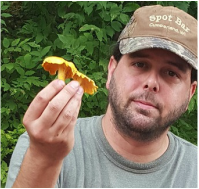
Tavis Lynch is a serious mycologist from northwestern Wisconsin. He has been studying fungi for most of his life and teaches several mycology classes for Wisconsin Indianhead Technical College. He has been a commercial mushroom forager for many years and has been cultivating mushrooms on a large scale for about 6 years. He leads several public and private forays throughout the year and is a certified mushroom expert by the Minnesota Department of Agriculture. Join the North Chapter Facebook Page here.
Tavis's forays meet at his house.
North Chapter 2016 Calendar
April 12/14
Mushrooms 101
Chetek, Wisconsin - Click on the link below for a detailed map. April 19/20
Spring Edibles - Chetek, Wisconsin
May 14
Mushroom Cultivation- Baldwin, WI
|
April 15
Farm Tours Begin - Cumberland, WI
Click on the link below for a detailed map. April 25
The Genus Russula - Shell Lake, WI
June 1
The Bolete Family- Shell Lake, WI
|
April 16
Woodlot management for Shitake Mushroom Farmers. Hayward Wisconsin
May 3-5
Spring Edibles - Webster, WI
June 4
Public Foray/Morels in The Maze
|
|
If You Suspect a Poisoning
If you suspect you have consumed a poisonous mushroom, contact a physician, the closest hospital ER, poison control center, or dial 911, depending on the severity of the reaction. US Poison Control: 1-800-222-1222 The North American Mycological Association (NAMA) has information that may also be of help. Click here. We do not ID mushrooms through this website.
If you are in need of an ID consider uploading quality photos with multiple views of your specimen and descriptions of your find to Mushroom Observer or iNaturalist including our projects or post in Wild Food Wisconsin or Mushroom Identification Group. If you contact us and provide a way to get back to you, we may be able to provide suggestions for more identification resources you can use. You are always responsible for your own decisions taken on the basis of identification resources. |
Wisconsin Mycological Society (WMS) is dedicated to the study and enjoyment of mushrooms and other fungi throughout the state of Wisconsin. Education, safety, sustainability, community, and connecting with nature are our goals.
|

